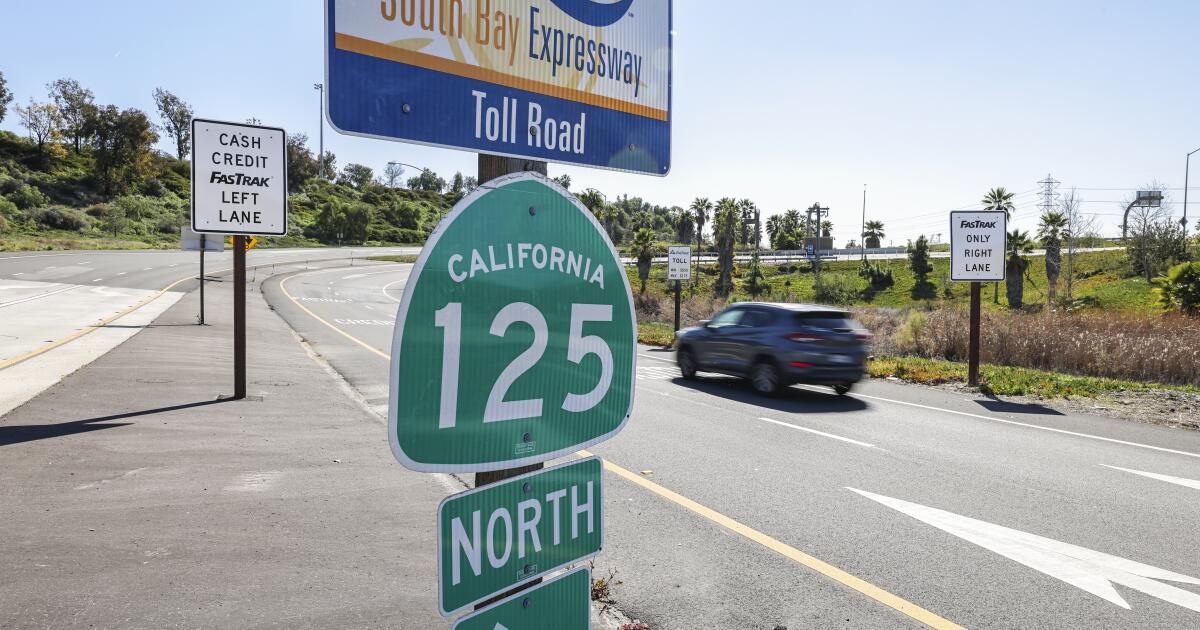

Directors of San Diego County’s regional planning agency wrestled Friday with long-running flaws in the South Bay Expressway toll system — and a wrongful-termination lawsuit filed by the finance director who says she called out the failures before she was dismissed.
The San Diego Association of Governments board pressed Chief Executive Officer Hasan Ikhrata and his top lieutenants about why they tolerated the broken toll system for years and extended agreements with the contractor and a consultant in charge of monitoring the program.
They wanted to know how much money had been paid to contractors who failed to deliver or properly advise on the project, why agreements were extended anyway and what plans the agency had to correct the situation.
SANDAG board members also wanted to know why they were not alerted to failures in the tolling software sooner.
“I would have preferred as a board to have been notified sooner than we were,” said Encinitas Mayor Tony Kranz, who represents the North County city on the planning agency known as SANDAG.
“This board’s credibility is on the line in these sorts of situations,” he said. “We know over the last few years the board’s credibility has sustained some blows. I’m looking forward to recovering from this one.”
The public meeting, which stretched for nearly three hours, was the first since former finance official Lauren Warrem sued SANDAG last month.
Warrem claims she was fired for no specific reason days after raising questions in a top-level meeting about how the agency planned to address inaccurate financial billings and reporting generated by the flawed software.
Warrem’s attorney, San Diego lawyer Josh Gruenberg, alleged in the complaint that his client was fired for pointing out that the software produced by ETAN Tolling Technology could not be fixed.
Before the public discussion, the SANDAG board of directors convened in closed session to discuss how to respond to the lawsuit. They announced at the start of the open session that the board formally denied the Warrem allegations.
Ikhrata, who announced his resignation earlier this year and will leave the agency at the end of the month, told the board that he had assumed full responsibility for the system failures that incorrectly billed thousands of drivers.
“It’s not the vendors and consultants that report to you. I do,” he said. “The buck stops with me. We’re not in the business of passing blame down. Everything that goes wrong is my fault.”
The CEO said he and his senior advisers had made a deliberate decision not to inform the board about failures in the tolling software until October. He said it was not a serious enough issue to bring to the board earlier.
“You hired the staff to make decisions, and when we needed to come to the board, we came to the board,” Ikhrata said.
In a report released early this week, SANDAG staff acknowledged that thousands of drivers along the 10-mile stretch of state Route 125 had been charged incorrect amounts to use the tollway and that their accounts were not properly credited when deposits were made.
During the meeting Friday, Chief Financial Officer Andre Douzdjian told the board that he and his staff had been through some 45,000 accounts and corrected almost all of the discrepancies.
He said the problems at this point were limited to “back-office” problems that did not properly transfer revenue collected from drivers to the agency’s general ledger. He said the monetary differences were not material issues because they total less than $9,000.
But he also acknowledged that SANDAG had paid ETAN more than $8 million even though problems with the software were identified years ago. He also noted that ETAN and technical support contractor HNTB received an additional $5 million despite the lack of performance.
At the same time, Douzdjian said SANDAG withheld some $1 million from ETAN as leverage to make corrections — or to make sure the company cooperates with a transition plan once a new vendor is hired.
“We made the decision that we had to make a change,” he said. “We realized in the September timeframe that we were never going to reconcile our books.”
SANDAG is already in negotiations to hire another tolling company to manage the 10-mile section of state Route 125 as well as the toll lanes Interstate 15 in north San Diego. That contract is expected to cost up to $28 million.
Douzdjian said the planning agency could seek to recover some $5.4 million in liquidated damages — money that SANDAG lost due to ETAN’s failures and delays. But he also noted the company will continue to be paid over what’s expected to be a 10-month transition.
The summary of events did not please Oceanside Councilmember Ryan Keim.
“It’s seven years later, and we don’t have a functioning system yet,” the SANDAG representative from Oceanside said.
Many of the business practices raised in the lawsuit filed by Warrem were previously cited in internal audits of SANDAG business practices.
The San Diego Union-Tribune reported last weekend that audits issued earlier this year and last found that SANDAG repeatedly extended contracts without telling the board, failed to adhere to best practices in procurement and did not implement protections against the possibility of contractors taking advantage of their agreements.
Ikhrata and other managers did not dispute most of the findings but also did not take specific steps to address the practices they critiqued.
SANDAG has hired an independent auditing firm to examine the tolling contract performance.
But that expert told the board on Friday that her review was just beginning because she only received the information she needed to start it this week.
“We just received the data this Monday,” Jennifer Farr of the Davis Farr accounting firm said. “We are still very much in the preliminary stages.”
Councilmember John Duncan of Coronado noted that in a private conversation with Douzdjian ahead of the Friday board meeting, the SANDAG chief financial officer implied that the external auditor already had initially determined that the tolling matter was less than serious.
“But Farr told the board today she was just getting started,” Duncan said.
El Cajon Mayor Bill Wells reiterated his call for an independent investigation, a probe he requested in the wake of the Warrem lawsuit. Wells also complained that he had yet to receive any reply to a series of 21 questions he submitted to SANDAG last month.
“What’s the plan to answer my questions?” he asked. “Will that be in writing?”
The staff said the Friday discussion was designed to answer any and all questions from Wells and other board members but that written responses could be provided if Wells desired.
SANDAG is the region’s leading planning agency for issues common to San Diego County cities and the unincorporated areas. It spends over $1.2 billion annually to promote mobility, build and operate transit projects and examine other issues like crime and the environment.
The agency is governed by elected officials from across the county, most of whom are part-time politicians whose primary public-service obligations are to the constituents who elected them to office.
On Friday, the board named Deputy CEO Coleen Clementson to the interim CEO position beginning next month. She will serve until a permanent successor to Ikhrata is hired.
Nora Vargas, the chair of the San Diego County Board of Supervisors who also serves as the SANDAG board chair, said she was satisfied that the planning agency was on track to reform its tolling problems.
“We have full confidence in you to come back with a plan and solve this,” Vargas told the staff before adjourning the meeting. “We are headed in the right direction.”





